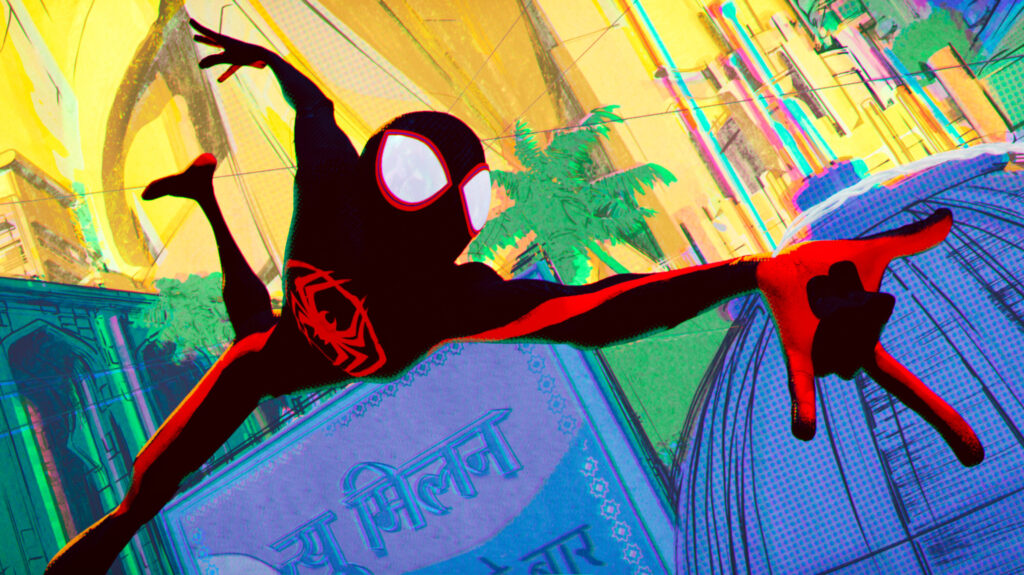Spider-Man: Across the Spider-Verse is a gorgeous sequel that’s firmly rooted in comic book lore
Written by Ian Thomas Malone, Posted in Blog, Movie Reviews, Pop Culture
Much of the superhero canon relies on throughlines developed decades ago, a lush if not rigid tapestry that’s defined the framework of storytelling that can draw newcomers in without alienating longtime fans. You don’t need to read hundreds of Batman or Spider-Man books to know that both heroes carry on their crusades in service to vows taken in the wake of dead relatives, just as The Man of Steel defines his life’s mission by his family’s creed that “The S stands for hope.” Part of what’s refreshing about newer heroes like Miles Morales is that the younger generation lacks such strict parameters, granting them more freedom to define their own journeys.
Spider-Man: Into the Spider-Verse largely succeeded off of its ability to bring a genuine sense of awe and wonder to the most over-saturated genre in the entire film industry, along the way winning the Academy Award for Best Animated Feature. Nearly five years later, Spider-Man: Across the Spider-Verse finds itself amidst a sea of multiverse-related movies, none quite achieving the visual splendor of its own predecessor. The endless variety that the very concept of a multiverse suggests creates certain lofty standards to deliver material that challenges its audience’s very definition of reality.
Across the Spider-Verse is quite possibly the most beautiful animated film ever made, a powerful testament to the sheer might of blockbuster filmmaking in possession of more than an iota of ambition. The innate appeal of a comic book likes in its ability to illustrate new worlds or fresh perspectives in every passing frame. No more has ever felt more like a comic book than Across the Spider-Verse, a sentiment that certainly applies to its less-than-earth-shattering premise.
The film largely picks up about a year and a half after the events of Into the Spider-Verse. Miles (Shameik Moore) is struggling to balance his scholarly ambitions with his extra-curricular web-slinging endeavors, along with an overbearing mother (Luna Lauren Vélez) who thinks New Jersey is too far away from Brooklyn for college while simultaneously allowing her son to board at a high school across the borough. On Earth-65 Gwen Stacy (Hailee Stenfield) remains at odds with her police officer father (Shea Whigham), joining up with the multiverse-hopping group the Spider Society, led by Miguel O’Hara (Oscar Isaac) and Jessica Drew (Issa Rae).
The bulk of the narrative centers around familiar comic book territory, namely Miles’ place in the larger Spider-canon, as well as the effect of his secret identity on his broader life. Directors Joaquim Dos Santos, Kemp Powers, and Justin K. Thompson juxtapose their fairly straightforward story with a non-stop barrage of breathtaking sequences, the kind of animation that makes you not want to blink for fear that you might miss something. The film pays homage to every single era of Spider-lore without ever coming across like it’s pandering to nostalgia.
Peter Parker’s presence looms large over the film, even if the characters and his many variations largely take a backseat throughout the narrative. Peter B. Parker (Jake Johnson) barely appears, Across the Spider-Verse is firmly caught in the original spider’s gravity, an awkward if not understandable dynamic. The film’s gargantuan 140-minute runtime covers plenty of plot without ever feeling like it’s overstuffed, a feat almost as impressive as its ability to keep a steady barrage of trippy animation that never gets old.
It is hard to shake the contrast between Miles’ desire to carve out his own path and Across the Spider-Verse’s insistence that his movie carries around the full weight of the franchise’s baggage. Can Miles ever truly own his own story when fans wait for a glimpse of 1990s relics such as O’Hara or Ben Reilly? The film firmly focuses on the questions of fate and agency, while never truly selling the idea that Miles could actually ever break free of the world defined on Peter Parker’s terms. A movie that tries to please everyone inevitably loses a bit of its own voice in the process.
Across the Spider-Verse is a singular superhero film, one of the few that tries to be a comic book more than a blockbuster. It’s one of the most beautiful sights to behold on the big screen, a triumph of ingenuity at a time when the genre itself is starting to buckle. For its subversive visuals, the narrative does not try to deconstruct the comic book so much as embody its chaotic power. Its narrative may not break the wheel, but it might leave you with a new appreciation for the way the wheel is designed in the first place.











